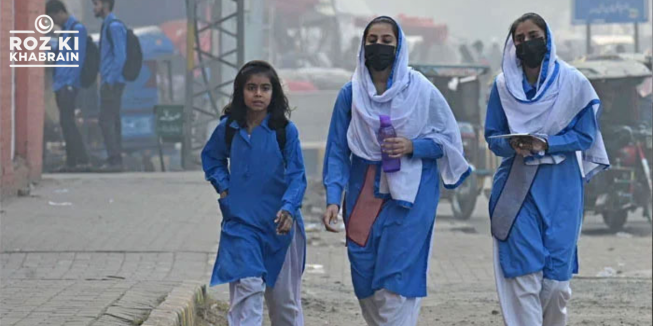The Punjab government has declared a health emergency in Lahore and Multan as the ongoing smog crisis continues to affect millions across the province, severely impacting both health and daily life.
Lahore, a city of 14 million people, has been grappling with thick smog for several days, a mix of fog, pollution from low-quality diesel emissions, smoke from seasonal crop burning, and winter weather conditions. Multan has been identified as the country’s most polluted city based on air quality.
On Friday, Senior Minister for Information and Environment Protection, Marriyum Aurangzeb, announced an extension of school closures in smog-affected areas across the province. “Schools will remain closed for another week due to hazardous air quality,” she said during a press briefing. Colleges and universities will switch to online classes to ensure the safety of students.
Lahore frequently ranks among the world’s most polluted cities, and this month, the air quality reached alarming levels, prompting extraordinary measures. The Air Quality Index (AQI) in Lahore dropped as low as 732 this morning before improving slightly to 669 by 1 p.m. on Friday, according to IQAir, a Swiss air quality monitoring company.
In response to the dire situation, authorities have imposed several strict measures. These include a ban on outdoor activities, the closure of schools, and restrictions on dining in restaurants, with establishments ordered to close by 8 p.m. Restaurants in Lahore and Multan will now only operate until 4 p.m., offering takeaway services until 8 p.m. A full lockdown will be enforced on Friday, Saturday, and Sunday, and construction activities will be prohibited from Saturday until the following Sunday.
Marriyum also mentioned that the government will reassess the situation on Wednesday before making any further decisions.
Meanwhile, the Lahore High Court (LHC) has emphasized the need for a long-term smog control strategy, urging the government to create a plan extending at least 10 years. The court has also recommended learning from Beijing’s environmental policies and implementing stricter regulations, including banning housing societies on agricultural land and planting more water-conserving trees.
The deteriorating air quality has significantly impacted public health, with more than 1.9 million people seeking medical treatment for smog-related issues in October alone. These include respiratory problems, asthma, heart conditions, and strokes. Health officials are advising citizens to stay indoors, keep windows closed, and wear face masks.
Punjab authorities have pointed to pollution from India, where the northern regions have also been experiencing hazardous air quality, and have vowed to raise the issue with India through diplomatic channels.




